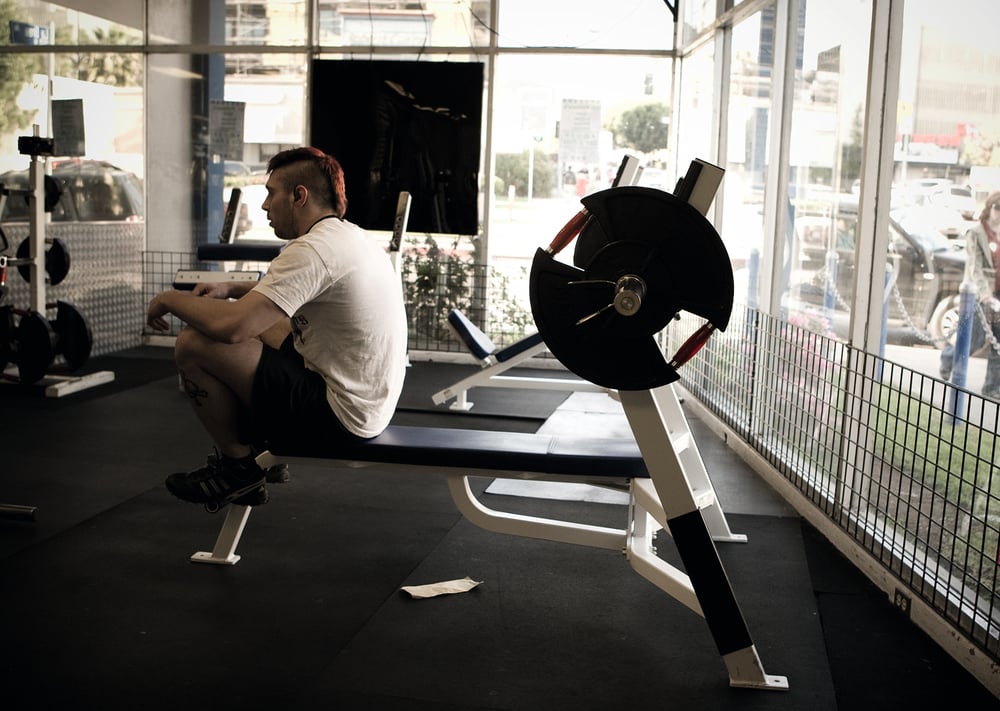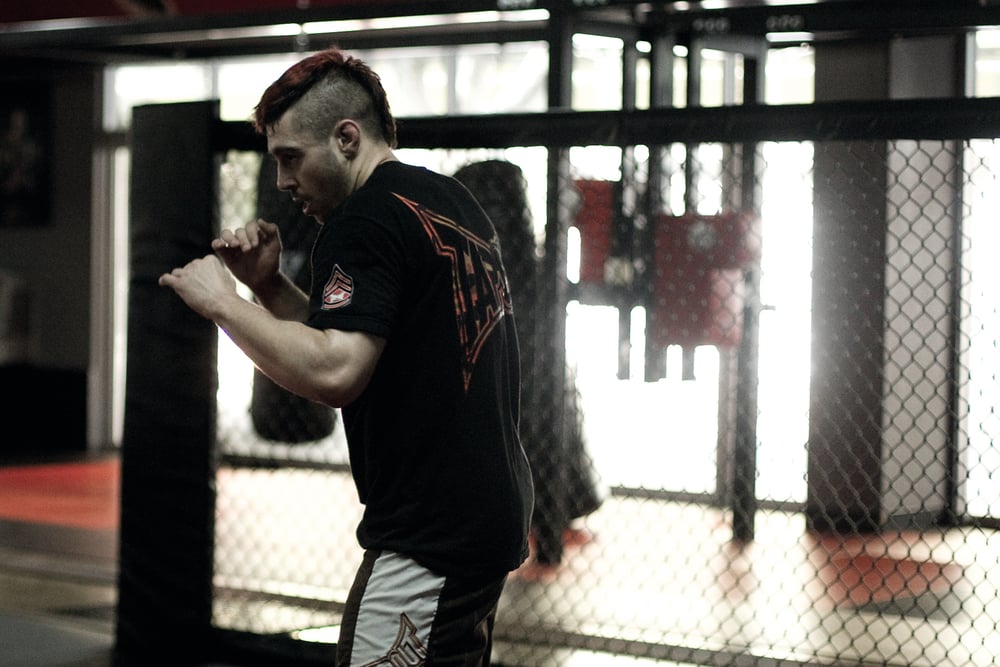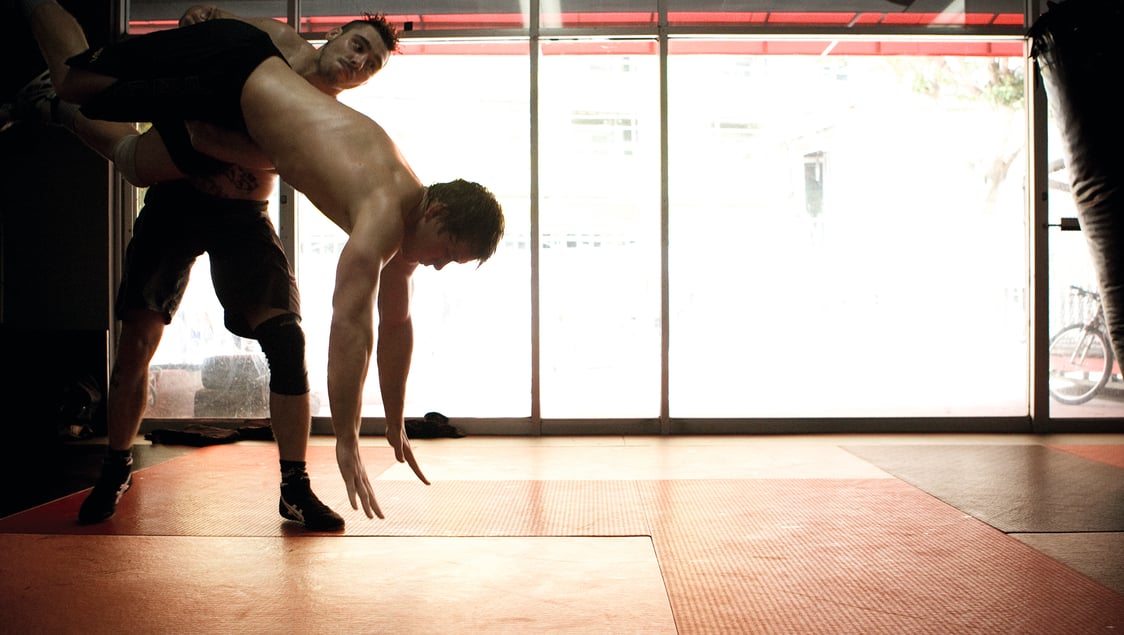
Issue 051
June 2009
In a modest, well-styled apartment in Hollywood, Dan Hardy lunches on a plate of grilled chicken from a local favorite, Roro’s Chicken. The sound of traffic just outside the window mixes in with the Ramon Dekkers’ DVD playing on the television. “I’ve always got this, Ramon Dekkers, or 101 Submissions playing,” Hardy says. The meal is well deserved, as earlier in the day Hardy spent over two hours being thrown about by wrestler Shaun Guttridge at Legends MMA just up the street.
“Why did you move here, to Los Angeles?” I ask.
“Eddie Bravo.” Hardy explains: “I was training with Paul Daley for the last few years and he came out to train at 10th Planet and came back, showed me a couple of things. Because I had the flexibility from tae kwon do, it suited me. I started using bits in fights with some success, and decided to come out here myself.”
Hardy recalls his first living quarters in Los Angeles, a dingy motel right next to Roro’s. “I spent five weeks training and as soon as I got home to the UK, I used my new skills with more success and thought, ‘I’ve gotta get back there as soon as I can.’
“I started subleasing places and spending more and more time here, two months at a time, three months at a time. I met my girlfriend at Legends and it got to that stage where I was spending more time here than I was in the UK.
“I just love it out here, the lifestyle suits me.”
Los Angeles is a polarizing city. Its sprawl daunts many. The fame-seekers, psychos, locals, and film-industry types intimidate most once the sheen has worn off. Those who make it fall in love with the color of the City of Angels, but those who don’t move out bitter.

Hardy has found one of its most lively traits, the gigantic music scene; this is a city where the best of every genre will turn up. Every band, good and bad, stops through Los Angeles. “This is going to sound strange, but there are more people into my kind of music out here, more gigs, a bigger scene.” Acknowledging that the UK was the birthplace of punk, Hardy smiles: “Just a few weeks ago Madball and Sick Of It All played on Sunset at the Key Club.”
“The thing about LA is that everything is within reach.” For jiu-jitsu, there’s a ton of reputable schools including 10th Planet and Jeff Glover’s. Los Angeles is a four-hour drive to Las Vegas. What’s at the heart of a city full of beautiful people? Gyms. “There’s more of a mentality for exercise here so the gyms are better, the coaching’s better.”
“And as far as lifestyle, I hate to say it”, Hardy laughs, “but I’m a fan of shopping. You’ve got Headline Records just across the street – the guy in there, he’s into hardcore, punk, ska, all the old stuff. And if you want a day at the beach, you can go. There’s a car museum, monster museum, so much stuff. My girlfriend and I have season passes to Six Flags [theme park] and we’ll head up and just ride Goliath for a few hours.” When Fedor Emelianenko is in Los Angeles, he too likes to visit Six Flags.
Even with the bright sun and solid training here in Los Angeles, Hardy still finishes up his training camp back in the UK, in Nottingham with Owen Comrie (his Thai boxing coach), Nathan Leverton (for his jiu-jitsu and the game plans), Ollie Richardson (for strength and conditioning training) and Phil Richards (his nutritionist).

Hardy will remain in Los Angeles for a few weeks and then leave for Germany on a press tour for the UFC. After a week of meeting troops and doing press conferences, it’s straight to camp in the UK.
“In the UK, I have all the pieces together, whereas in LA, I’m still trying to piece together the bits.” Hardy notes that while Los Angeles is a city that offers everything, its training facilities are spread out over a large, traffic-filled area. “There are more training partners in LA at a decent level but I have to be a lot more flexible to fit in everything I need.”
The afternoon sun starts to beat through the window and it’s time to head to the chiropractor. While driving to the doctor’s office, Hardy points out a dresser emblazoned with the Union Jack in the window of a trendy furniture store, “That would look great in my place”. Time away from England has made Hardy nostalgic for home. His English core stays intact, because Los Angeles is an international crossroad, few of Hollywood’s inhabitants are born within city limits.
After parking, Hardy walks over to the Max Health Center to see performance therapist Shy Azoulay and chiropractor Robert Joseph. Shy begins Hardy’s treatment with a cold laser on his ear to heal a cut, sustained during the morning wrestling session with Shaun. Dan grabs a pack of ox bones off the windowsill, pulling out a smooth, flat tool. “Shy scrapes me with these. It’s excruciating.” Shy explains that the flat bones help push out the knots in the muscles. Then taking what appeared to be a modified jigsaw, he pummeled at Dan’s legs, getting the UFC fighter to wince in pain, wringing his fists.
Later on chiropractor Robert Joseph comes in, explaining, while cracking Hardy’s back, neck and hips, that fighters have an overly forward posture due to tucking their chins, which actually hurts the mobility in their neck and causes the neck more strain because it holds more weight. Hardy looks up at the x-rays on the wall depicting a forward posture and a normal posture, “I always look up at that and think I could knock that ‘normal’ guy out, him sticking his chin up in the air like that.”

Walking back to the car, Dan keeps the sun out of his eyes with a Raiders cap, which replaced a Dallas Cowboys cap just a few hours before. Hardy is a fan of American football, “I wear football jerseys to my training camps. For my last training camp, I wrote on my left handwrap, #11, for Larry Fitzgerald of the Cardinals, and on my right, #43, Troy Polamalu of the Steelers.” Hardy appreciates all sports where athletic ability is paired with toughness, citing an appreciation for ice hockey as well, but very much a fan of the skill and personalities of stars like Terrell Owens and Troy Polamalu. Hardy mentally anchors his emotions and his goals to specific traits. “I want Fitzgerald’s speed and intensity on my jab; and for my right, I want the power of Polamalu. It keeps me focused on my game plan.”
While he can’t stand English Premier League soccer, Hardy maintains he loves the rough, fighting mentality of the sport – a sport his father excelled at, and had hoped one day for his son to start for Nottingham Forest. The drama of international soccer, the diving and rolling, turns Hardy away from the Premier League. He’s attached to his father’s image as a player, likened to a Vinnie Jones type, who taught Dan to drag his studs down an opponent’s leg while going for the ball.

Having grown up with such a colorful influence, it seems surprising that it wasn’t the roughness on the pitch that inspired Hardy to become a fighter, but the Teenage Mutant Ninja Turtles. “When I was a kid, I ran around kicking kids, but not to cause them pain. I was doing it because I wanted to be a Ninja Turtle.” Smartly, Hardy’s parents redirected his energy into martial arts classes, to which he dedicated a lot of time. “I took an interest in martial arts not because it was beating somebody up, but I liked aesthetically how people moved when they were fighting. I appreciated their physical capabilities and skill.”
Young Dan Hardy thrived off competing in tournaments because, win or lose, if you gave it 100% the crowd always respected the effort. He likes Japanese MMA for the same reasons, where the fans love a fighter, win or lose, as long as he fought hard and showed skill. Though martial arts were always in his life, Hardy pursued a degree in contemporary art for two years before coming to a crossroads. “It got to the stage when I was going to university, working at shops and training at the gym next to it [the university], running between all three. I had my portfolio and art supplies on one shoulder and my training bag on the other. I would stand on the road between the two and wonder which to go to and I’d always choose the gym.” Ultimately Hardy decided that, in the years to come, the university would still be there; his youth and physical skill would not – and so he quit school.
Hardy only started training full-time four fights ago; even though he wasn’t making a lot of money, he felt ready to make all the necessary sacrifices. “I knew that I was on the verge, that UFC contract was within reach. I told myself, ‘just live rough for a little bit and give it everything’, and it paid off.” Today, being in the UFC validates his efforts, and now serves as automatic recognition of the years of hard work he put into becoming a top fighter.

His signature hairstyle also serves as automatic recognition; the red Mohawk is synonymous with "The Outlaw". He laughs at the flipside of having such a distinct do, “Well, when I don’t have it people seem disappointed. Though when I want to keep a low profile I just have to shave it. No one knows who I am. It’s like a disguise.” After saying this Dan enters the Hollywood Boxing Gym to lift weights, asking the manager if, promising not to bother any other patrons, it will be all right for a photographer to shoot him today. The manager shrugs and says, “Who are you?” Dan lifts up his Raiders cap to show his Mohawk and the woman exclaims, “Oh, hi Dan! Sure! C’mon in!”
This upcoming fight with Marcus Davis at UFC 99 is a fight Hardy has been looking forward to from the day he signed his UFC contract. Joe Silva asked him for a list of fights he’d like to face down the line, and Davis’s name was at the top. “I thought he had an interesting style, a good boxer, southpaw, decent wrestling, subs. He’s a challenge in every area, which appeals to me.
“But I think I can beat Marcus in every area as well,” Hardy chuckles. A win over Davis would be a respectable notch on his belt, with Davis 8-2 in the UFC and a known fighter to the American public due to being on The Ultimate Fighter. Such a victory would do a lot for a young fighter like Hardy, who is trying to establish himself in the UFC.
With this next bout in Germany, Hardy is reconsidering his usual walkout song, ‘England Belongs to Me’, questioning whether it will have the same impact as it did at the O2 Arena. Dan considers the options: “Well, I was thinking of coming out to ‘Plastic Paddy’ on account of Marcus Davis being a fake Irishman and all.”

As the day of training comes to an end, Dan gets on his computer to read forums, watch fights and correspond with his family. When asked about what his family thinks of fighting, he responds, “They’re coming around. For starters, they didn’t like it, not because they didn’t like the sport but because they were concerned for my safety. But they were at the last fight in the front row, my dad, mum, sister, and her boyfriend, making loads of noise, waving a flag with my name on it. But my mum hides behind the flag, can’t bear to watch. Luckily, she didn’t have to hide too long, she had just sat down and put the flag over her face when I knocked Markham out and it was done.”
The Outlaw lights up, recalling the moment. “It was awesome. Awesome! It was one of those punches – if you land a good clean knockout, you don’t feel any contact, because the punch goes straight through. And to be co-main event at the O2 arena, to walk out to the crowd of 14,000, and he wasn’t British so everyone’s on my side, the place is buzzing, the atmosphere is amazing.”
He notes, “I’m not known for quick finishes, I wear people down over a couple of rounds, but the opportunity presented itself so I took advantage. Because it was over so fast and there was so much tension leading up to the fight, you could feel the relief throughout the crowd.” The crowd expressed that relief with enormously loud cheers. “I can’t imagine anything could compete with that.”
Looking around as if someone else was listening in, Dan laughs. “Well, maybe having kids is pretty good. But until then, that night when I knocked Markham out was the best thing I’ve ever experienced.”
...









